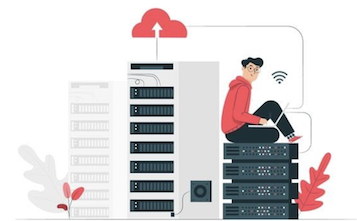List out the difference between shared, VPS dedicated hosting
2021.03.17
Deciding between VPS and shared hosting can sound like a challenging process. Although these two forms of hosting both have the same end purpose, choosing the right method will make your life as a website owner less complicated. The final judgment involves the needs of your website as well as your finances.

Shared Hosting
Imagine shared hosting as living in an apartment complex with a parking lot and a playground used by the neighbors. It's a way for hosting providers to install a large number of users on the same server. This method of hosting allows you to rent space from a shared hosting server.
Every website that hosts on shared hosting will share all the available resources. Each user within the same shared server gives a fixed amount of disc space, server memory, CPU, and more.
However, even though you are using the same physical device, you can build your user profile and install whatever applications and programs you want. Although shared hosting is a decent entry-level alternative, most users would inevitably outgrow shared hosting.
Shared hosting is the perfect choice for people to create their first website because of its low cost and beginner-friendly functionality. It's the cheapest, most popular, and most commonly accessible form of hosting solution.
Since you don't have to manage your website, no technical knowledge is necessary. As a result, shared hosting is a perfect alternative if you're looking for an easy-to-maintain hosting option. You're not going to have to think about updates because most of them will handle automatically.
Shared hosting is usually for websites with fixed content that do not update frequently. It's ideal for simple personal websites, including blogs and start-ups. If the amount of traffic your site receives continues to rise, you may want to update your hosting packages to ensure high-quality performance.

VPS Hosting
Virtual Private Server (VPS) Hosting provides a virtual environment that simulates a dedicated server inside a shared hosting framework. While you're always running on a shared server with others, you're going to have a higher degree of control.
VPS hosting provides each user with a dedicated virtual partition. There are fewer sites that share space and resources, and the server will partition into separate virtual server environments.
With VPS hosting, you are in full charge of your server, and you can customize it in any way you want. You're often going to enjoy a massive amount of bandwidth and storage that's yours.
VPS Hosting lets you experience fast backup and scalability, and you can run several batch files with access to your shell. It's perfect for small businesses, online retailers, and giant personal pages. It's also fantastic if you're trying to expand your website.
This post would demonstrate the main areas to determine the essential distinctions and define the best hosting that fits your needs.
Performance:
If you want to keep your customers satisfied, you need to provide top-notch performance for them. A survey conducted by Kissmetrics showed that almost half of web users expect a site to load within a few seconds. They had tended to leave a website that will not load within three seconds.
If you use shared hosting, sites with which you share a server can affect your performance. With shared hosting, you're too dependent on the people around you. But it has decent performance on static and low-traffic websites.
Shared hosting provides a decent uptime and enough bandwidth to handle hundreds of users a week. It's ideal for small websites with no significant numbers of users. But remember how a sudden rise in the popularity of the platform has an impact on performance. If the server is overcrowded or if another website uses more than its share of resources, the performance may drop.
Using VPS hosting, you usually get more bandwidth, and it's more suited to manage traffic spikes. It has a decent page loading time and enough bandwidth to support thousands of visitors per week.
However, if you do not have the technical skills about your VPS, you should consider other choices. When handling isn't professional, it can lead to a whole number of other issues.
VPS hosting ensures higher average efficiency depending on the bandwidth it gives to consumers. You will have greater flexibility to manage the applications, but you will need to make sure that you have a dedicated system administrator to keep the application running smoothly.
If you have heavy traffic needs or several sites to handle, VPS would be the safest option. You will get more hardware with VPS hosting that is equivalent to more resources. There is less concern about how other websites can impact your results.
Security
Any type of business is vulnerable to cyber threats, so if you run an e-commerce shop and deal consistently with financial transfers, security will be an essential concern if you're new to blogging.
By using shared hosting, some features will handle by your hosting provider. So, features such as security, updates, and server maintenance never experience any failure. Providers do lots of work regarding safety, but there are no guarantees.
Sharing hosting is at a greater security risk. You are more vulnerable to security attacks on a shared network, mainly because other sites use your server. If one domain makes a mistake and has a security failure, then every domain on that server is vulnerable.
On the other hand, Cheap Windows VPS Hosting is more secure than that. As a starter, you're on a server with other VPS users, which means everyone has a higher degree of protection. Each client occupies his own space, separated from his neighbors with separate IP addresses. Besides, you should install personal protection software to ensure that you are safe, even though some are not on your server.
Using a VPS, you will guarantee the security of your site with advanced security features. These features are only accessible with VPS hosting. If the budget allows, you can implement excellent support services that can benefit customers when they need them. If your business needs to secure personal data, it's worth considering a VPS upgrade.
Scalability
The scalability rating evaluates how difficult it is to scale the limits of the product resource. The more challenging it is to scalability, the lower the ranking. Versatility and turn-around time also play a role in scaling that varies between different web hosts.
Shared server packages are usually not very scalable. It also doesn't have the potential to scale and sustain a growing platform. In this situation, there's a possibility you'll need to move to a VPS hosting plan or some other form of hosting.
VPS hosting is more dynamic than shared hosting. If your traffic demands are currently expanding, you can readily scale up your server capacity. Since you are not limited to a single physical server, it's convenient to add more server resources. This level of flexibility and scalability seems to be almost impossible to find with shared hosting.
Although shared hosting has its advantages for personal sites or small businesses with no intentions of expanding, VPS is essential for large enterprises who wish to scale up without fear of crashing their websites. But if you own a small website that only receives a few hundred visitors a week and you don't intend to grow very far, shared hosting is perfect.
Controllability and Configurability
Shared environments are almost out of your control. A shared hosting service is restricted only to standard server configurations that may be more beneficial to people who do not want to interfere with server administration activities.
If you need to have unique applications or you need special configurations on your server, it may be unusual to have a shared hosting plan that contains precisely that set of features. It would also be unlikely that your host would install a special package for you on a shared computer that could pose a security risk to other tenants.
VPS hosting is where you have a higher level of control, but you're still running on a shared server with others. Since it can configure with extra-apps, you can have more control over your hosting area. Plus, you can find many online details to help you with your hosting and setting up your website.
With shared hosting, the initial setup of the server hardware and software is limited. The shared hosting package would offer you access to an intuitive control panel and user dashboard.
Pricing
Both shared hosting and VPS hosting are available at various price ranges. Of course, the more expensive the plan you're looking for, the more resources, security, and performance you're having.
Shared hosting is the cheapest form of hosting available on the market. Because of design, packages are very low-cost. Shared servers also rely on hardware overselling that ensures more users reside on the server.
VPS is available at a higher price than shared hosting. Its costs do, however, justify its better benefit. VPS solutions come in several types, from the smallest 2 GB VPS to the 128 core machines. VPS Parent servers will design with the latest hardware available at the time. It provides the most versatile configurations for consumers.
You should understand that there is more to choosing a precise hosting platform than just pricing. In reality, basing your decision entirely on the price is a recipe for disaster.
Conclusion
In this article, we reviewed Shared hosting vs VPS hosting. Virtual Private Server (VPS) hosting would provide your site with a higher degree of performance, scalability, and security. But these features can come at a high cost, so it's not the right option in every circumstance. Security is more in your power as you select VPS hosting along with a wider variety of security tools from your provider. If you intend to process user information through your platform, avoid shared hosting.
Although there are many factors between shared hosting vs VPS hosting, the choice should essentially differ based on the performance needs, your security requirements, your technical skills, and your budget.
Source: RouterHosting.com
More Articles
Copyright © Fooyoh.com All rights reserved.